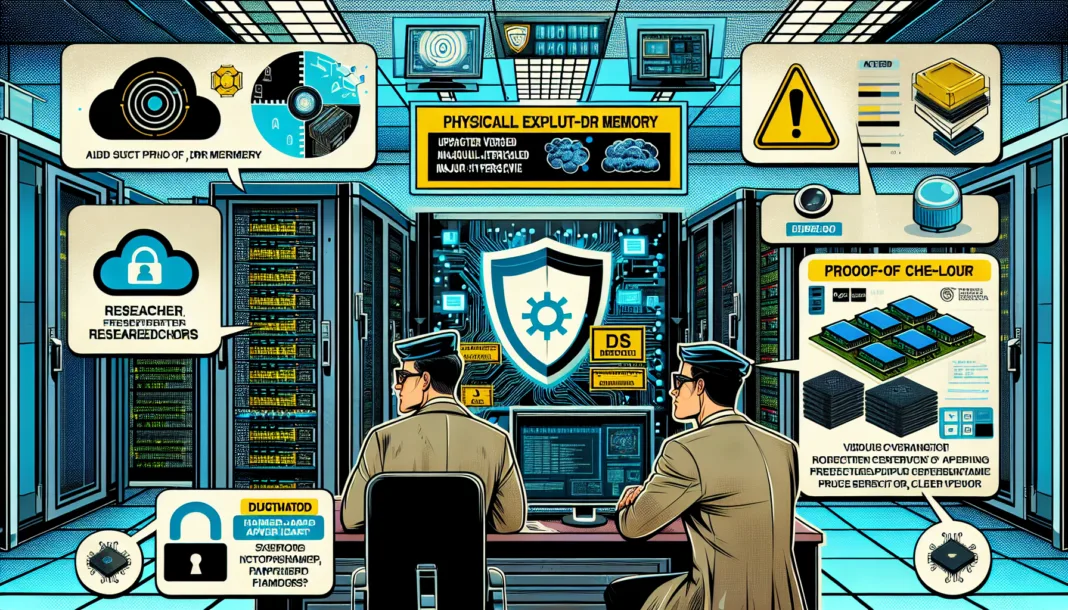KEY TAKEAWAYS
- Researchers have disclosed a physical exploit targeting DDR5 memory in Intel TDX, requiring direct server access.
- Phala Cloud assures its infrastructure is secure against this vulnerability, leveraging Tier-3+ data centers and hyperscaler integrations.
- The DDR5 vulnerability emphasizes the need for hardware trust, including physical provenance, in confidential computing.
- Phala’s Proof-of-Cloud framework ensures secure, verified environments by integrating attestation, provenance, and physical security.
Researchers have publicly disclosed an updated version of a physical exploit targeting DDR5 memory used in Intel TDX and other trusted execution environments (TEEs). This exploit, known as tee.fail, requires direct physical access to a running server. The attacker must attach a custom interposer to the memory bus to read encrypted traffic and infer cryptographic keys.
This vulnerability serves as a reminder that attestation alone does not prove the physical location of confidential workloads. The attack underscores the importance of considering hardware trust, including physical provenance, in the security of confidential computing environments.
Phala Cloud’s Security Measures
Phala Cloud has assured its customers that their systems remain secure against this DDR5 vulnerability. The attack cannot be executed remotely and does not affect Phala’s operating infrastructure. Phala Cloud operates on a combination of OVH and bare-metal infrastructure deployed in professionally managed Tier-3+ data centers. These facilities feature biometric access, full video surveillance, tamper-evident hardware controls, and audited operations.
Additionally, Phala is integrating with major hyperscalers such as Google Cloud (GCP), Microsoft Azure, and AWS to extend its Proof-of-Cloud framework. This framework aims to provide enterprise-grade confidential computing environments globally. Phala’s systems run in verified facilities with continuous attestation and controlled supply chains, ensuring no feasible path for the physical DDR5 attack to occur.
Industry Implications and Solutions
The DDR5 vulnerability highlights the necessity for hardware trust to include physical provenance. While attestation can confirm what is running, it does not verify where it runs or who can access it. As confidential computing becomes critical infrastructure for AI and Web3, this layer of trust is essential.
Phala Cloud’s solution, called Proof-of-Cloud, combines attestation, provenance, and physical security. Each server is bound to a unique Platform Provisioning ID (PPID), allowing verification that workloads run only on whitelisted CPUs and verified data centers. This framework provides real-time attestation status, provider provenance, and the ability to detect and revoke compromised or relocated hardware immediately.
Phala is collaborating with Intel and leading TEE networks such as Secret Network and NearAI to standardize Proof-of-Cloud as an industry-wide trust framework. Upcoming integrations with GCP, Azure, and AWS will extend physical provenance verification to their confidential computing platforms, offering users a consistent trust model across clouds.
For more details, the full announcement can be found here.
Why This Matters: Impact, Industry Trends & Expert Insights
The recent disclosure of a DDR5 vulnerability, known as tee.fail, highlights the critical need for enhanced hardware security measures in confidential computing environments. This exploit requires physical access to servers, emphasizing the limitations of current attestation methods in verifying the physical security of computing environments.
Recent industry reports indicate that vulnerabilities in DDR5 memory, such as the TEE.Fail side-channel attack, pose serious security risks to trusted execution environments. This aligns with the news event as it underscores the ongoing challenges in maintaining robust hardware security for confidential computing.
As per insights from Tom’s Hardware, DDR5 memory remains vulnerable to sophisticated attacks that can compromise cloud security. This supports the significance of Phala Cloud’s approach to enhancing security measures against these vulnerabilities.
Explore More News:
Disclaimer: The views expressed in this article are those of the authors and do not necessarily reflect the official policy of CoinsHolder. Content, including that generated with the help of AI, is for informational purposes only and is not intended as legal, financial, or professional advice. Readers should do their research before taking any actions related to the company and carry full responsibility for their decisions.

